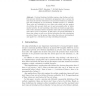Free Online Productivity Tools
i2Speak
i2Symbol
i2OCR
iTex2Img
iWeb2Print
iWeb2Shot
i2Type
iPdf2Split
iPdf2Merge
i2Bopomofo
i2Arabic
i2Style
i2Image
i2PDF
iLatex2Rtf
Sci2ools
CSCLP
2004
Springer
2004
Springer
Better Propagation for Non-preemptive Single-Resource Constraint Problems
Abstract. Overload checking, forbidden regions, edge finding, and notfirst/not-last detection are well-known propagation rules to prune the start times of activities which have to be processed without any interruption and overlapping on an exclusively available resource, i.e. machine. These rules are extendable by two other rules which take the number of activities into account which are at most processable after or before another activity. To our knowledge, these rules are based on approximations of the (minimal) earliest completion times and the (maximal) latest start times of sets of activities. In this paper, the precise definitions of these time values as well as an efficient procedure for their calculations are given. Based on the precise time values the rules are re-formulated and applied to a well-known job shop scheduling benchmark.
Related Content
| Added | 01 Jul 2010 |
| Updated | 01 Jul 2010 |
| Type | Conference |
| Year | 2004 |
| Where | CSCLP |
| Authors | Armin Wolf |
Comments (0)

